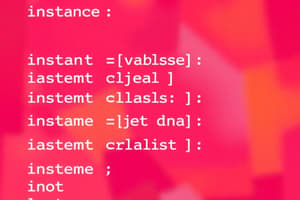Podcast
Questions and Answers
What are fields and methods declared without the keyword static called?
What are fields and methods declared without the keyword static called?
- Instance Fields and Methods (correct)
- Non-static Fields and Methods
- Static Fields and Methods
- Class Fields and Methods
When an object is created, what does it contain?
When an object is created, what does it contain?
Each object will have its own instance of non-static fields and non-static methods.
Instance fields and methods require an object to be created in order to be used.
Instance fields and methods require an object to be created in order to be used.
True (A)
What is the purpose of grouping methods?
What is the purpose of grouping methods?
How do you make code more usable in Java?
How do you make code more usable in Java?
What determines how code is shared across classes?
What determines how code is shared across classes?
What does extensible language refer to in Java?
What does extensible language refer to in Java?
What is the format of a class declaration in Java?
What is the format of a class declaration in Java?
Some variables can only be considered fields (class-level) and others must be local (method-level).
Some variables can only be considered fields (class-level) and others must be local (method-level).
What are fields used by static methods required to be?
What are fields used by static methods required to be?
What do static/non-instance members of a class belong to?
What do static/non-instance members of a class belong to?
Instance members of a class are static.
Instance members of a class are static.
What are methods in the context of classes?
What are methods in the context of classes?
What are fields in Java?
What are fields in Java?
How are instance members carried in a program?
How are instance members carried in a program?
Non-static/instance methods can call static methods in another class without creating an object.
Non-static/instance methods can call static methods in another class without creating an object.
What is the format for declaring a non-static instance?
What is the format for declaring a non-static instance?
What are class members?
What are class members?
What does 'Scanner input = new Scanner(System.in);' illustrate?
What does 'Scanner input = new Scanner(System.in);' illustrate?
Can multiple instances of the same class run at the same time?
Can multiple instances of the same class run at the same time?
Each instance of a class has a unique set of fields and methods.
Each instance of a class has a unique set of fields and methods.
Can instances of a class be declared in different programs?
Can instances of a class be declared in different programs?
What are fields and methods of a class considered?
What are fields and methods of a class considered?
Flashcards are hidden until you start studying
Study Notes
Instance Fields and Methods
- Instance fields and methods are declared without the keyword static, specific to individual objects of a class.
- Each object created has its own unique instance of non-static fields and methods.
Object Creation
- Instance fields and methods require object instantiation to be utilized.
Code Organization
- Methods facilitate organizing code for specific tasks, enhancing code flexibility and reusability.
Sharing Code Across Classes
- Code sharing among classes depends on whether fields and methods are declared as instance or non-instance class members.
Extensibility of Java
- Java is considered an extensible language, allowing for the declaration of new classes as necessary.
Class Declaration
- Class format:
public class NameOfClass { }, must be saved with a .java extension, matching the class name.
Variable Scope
- Variables can be class-level fields or method-level local variables.
Static Methods
- Fields accessed by static methods must be static; static methods and fields are non-instance class members.
Characteristics of Static Members
- Static or non-instance members belong to the class during execution and are invoked using the class name or an object.
Instance Members Characteristics
- Instance members are non-static and associated with individual object instances of a class.
Methods and Fields
- Instance methods process data and perform functions, while instance fields are variables that store data.
Instance Members Details
- Instance members carry with an object as used, permitting multiple instances with each having its own set of fields and methods.
Calling Methods
- Non-static methods can invoke both static and non-static methods within the same class.
Method Calling Context
- Non-static methods need to be called through an object of the class; instantiation is necessary for accessing instance members.
Format for Instance Method Creation
- Creating an instance:
NameOfClass objectName = new NameOfClass(); - Optionally include parameters:
NameOfClass objectName = new NameOfClass(argN, argM);
Class Members Definition
- All fields and methods, regardless of being static or non-static, are classified as class members.
Scanner Class Instantiation
- Instantiating two Scanner objects demonstrates that multiple instances of the same class can operate concurrently, each referred to by its distinct reference variable (e.g., input, keyboard).
Instance Relationships
- Each instance possesses identical fields and methods; however, each set is unique to its respective instance.
Instance Declaration Scope
- Instances can be declared within the same program or across different programs running simultaneously on the same system.
Class Members Summary
- All fields and methods of a class, as class members, contribute to the overall structure and functionality of the class.
Studying That Suits You
Use AI to generate personalized quizzes and flashcards to suit your learning preferences.




